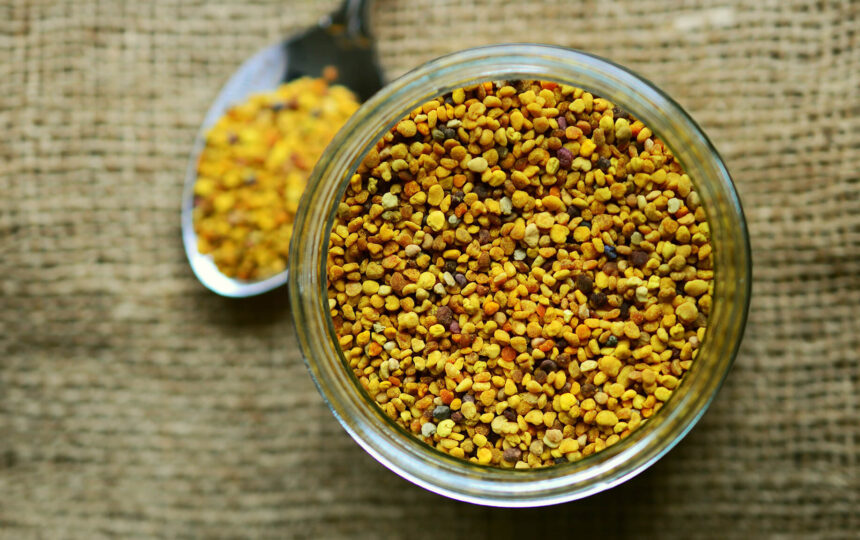Bee pollen isn’t just for humans and bees. This extraordinary superfood is loaded with remarkable benefits that make it perfect for your canine companion. If your dog experiences environmental allergies or simply needs a pick-me-up, bee pollen can help.
Here’s how this underrated health powerhouse could help your dog feel and act their best. If you don’t already love bees, you will after reading this.
What is bee pollen?
Before digging into the benefits of bee pollen, it’s important to understand what it is and how it is formed.
Bees work hard, flitting from one flower to the next, collecting as much pollen as they can. Then, they mix it and pack it into pellets, carrying it in little baskets on their hind legs to the hive, where it is used to feed larvae and support the next generation of bees.
Essentially, bee pollen is hard pellets of packed flower pollen mixed with nectar and bee saliva that possess extraordinary health benefits!
What is the nutritional profile?
It is one of the most nutrient-dense, diverse foods available, consisting of vitamins, minerals, carbohydrates, lipids, and protein. In fact, it contains over 25 minerals and essential amino acids.
It contains 35% protein and 50% carbohydrates and has potent antioxidants like flavanol and resveratrol that help fight free radicals and improve overall health.
How is it collected?
Many people worry that bee pollen collection somehow harms the bees or inhibits their ability to feed their young. Thankfully, this isn’t the case. Beekeepers use specially designed traps at the entrance to the hive to collect a small amount of pollen from each bee that enters, leaving plenty for the baby bees.
Why is bee pollen good for dogs?
But what does this have to do with your favorite furry friend? Why should you give bee pollen to your beloved pooch? Is it really that beneficial?
Let’s take a look….
Bee pollen decreases allergies
Does your dog get itchy when they go outside at certain times of the year? If they don’t have fleas, you could be dealing with an environmental allergy. Dogs with allergies will often itch or scratch excessively, leading to potential skin conditions or infections.
One of the most well-documented benefits of bee pollen is its ability to reduce seasonal and environmental allergies. Just like a small daily dose of local honey can help reduce seasonal allergies in humans, a regular dose of bee pollen can help your dog fight off certain allergic reactions.
According to research, bee pollen contains a natural antihistamine called quercetin. It functions much the same as over-the-counter antihistamines such as Zyrtec, Benadryl, and Claritin. However, unlike these drugs, bee pollen is totally natural and is safe to give your dog every day.
Local bee pollen is especially beneficial as it contains small amounts of the allergens that cause your dog to flare up. Over time, this gentle exposure helps reduce their sensitivity.
Bee pollen is loaded with fatty acids
Dietary fatty acids are critical for your pup’s overall health and wellbeing, and bee pollen is loaded with them. This incredible superfood is a wonderful source of omega-3 and omega-6 fatty acids that help keep your dog’s coat shiny, their brain sharp, and their skin healthy. These fatty acids could even improve liver function and protect the nervous system
Bee pollen is anti-inflammatory
Chronic inflammation is a silent killer that rages in many pets. It contributes to a host of health issues, such as arthritis, diabetes, heart disease, and kidney failure. Bee pollen is a proven anti-inflammatory agent that can keep inflammation at bay and help your dog stay healthy.
Other potential benefits of bee pollen for dogs:
- Improves heart function — Bee pollen could help lower bad cholesterol levels that contribute to heart disease. Yes, even dogs can get high cholesterol.
- Supports liver health -Some studies in rats show that bee pollen could help heal the liver after damage.
- Strengthens immune system – Bee pollen has antimicrobial, antiviral, and antifungal properties that could kill harmful bacteria.
- Decreases stress and anxiety — Improved blood flow to the nervous system means better mental health and decreased stress.
- Soothes skin conditions — Fatty acids are essential for skin health and could decrease the risk of chronic skin conditions.
- Improves healing — Bee pollen could speed wound healing due to its anti-inflammatory, antibacterial, and circulatory benefits.
Note: Many studies on the benefits of bee pollen are still in their infancy. There is some debate regarding the efficacy of bee pollen, but science is quickly catching on to this remarkable resource.
How to give bee pollen to your pup
Mix bee pollen into your dog’s food daily. Many dogs love the taste of bee pollen and won’t hesitate to dig in! If they’re picky eaters, try grinding it up into a powder or blending it with some water and pouring it over their food. If that still doesn’t work, hide it in a small spoonful of natural peanut butter.
Most experts recommend starting with a tiny dose and working to a larger dose of about 1 tsp per 50 pounds of body weight. Some dogs experience a slight allergic reaction when they first take bee pollen, so it is important to ease into it.
Start with about ⅓ a tsp per every 50 pounds and gradually increase to the full amount (over about a week) if there are no adverse reactions.
Notes: Some pet-specific bee pollen products will have different dosage recommendations. Follow the instructions on the package or consult a vet. The above guideline is for raw, locally-sourced bee pollen.
Where to find bee pollen
Of course, as with most things, it is possible to order bee pollen online. However, remember that local bee pollen may be more beneficial for reducing allergies in your furry friend.
If you shop online, fresh, raw, organic bee pollen is always the best choice and will help your pup get maximum health benefits — without harmful preservatives. As a bonus, you can incorporate it into your diet and reap the same incredible rewards!
Note: Low-quality, tainted bee pollen could prove deadly! Do your research and purchase from a trusted, reputable brand.
Are there any side effects of bee pollen for dogs?
Bee pollen is generally considered safe for dogs. However, certain dogs with pollen allergies may have an allergic reaction. If you notice your dog acting unusually after eating bee pollen or if their allergies worsen, discontinue use immediately. Take them to the vet if their condition worsens or doesn’t improve.
Dogs with diabetes may experience adverse reactions to bee pollen. It is high in natural glucose and fructose and could cause blood sugar spikes. Talk with your vet before giving your dog bee pollen if they are on any medication or have been diagnosed with diabetes.
If you have any questions regarding bee pollen or the best amount to give your pet, it’s always a good idea to speak to your veterinarian. Remember, since bee pollen is technically a supplement, many vets might not favor feeding it to your dog. Find a well-reviewed holistic vet who supports your natural pet care and can best advise on bee pollen usage.
What about honey?
You might be thinking, doesn’t honey possess all of the same benefits? It’s easier to access, and most dogs love it. Wouldn’t it be simpler to give them honey instead?
While honey possesses many of the same benefits for allergies, it isn’t as nutritious as bee pollen. It contains less protein and is missing many of the essential amino acids. You can certainly give your dog a small amount of honey as a treat, but you shouldn’t use it as a supplement like you would with bee pollen.
Honey has a lot of natural sugar and could prove unhealthy if given in excess.
Bee pollen: The secret pet superfood
Bees are indeed one of nature’s great wonders. These tiny insects tirelessly pollinate crops and flowers, produce honey, and provide bee pollen. What’s not to love?
Bee pollen contains beneficial nutrients and minerals that can help support your dog’s health. But remember, like any supplement for humans; it is not a replacement for low-quality food or a sedentary lifestyle. Along with a healthy, raw food diet and plenty of exercise, this secret superfood could be the key to helping your dog live their best life yet.






